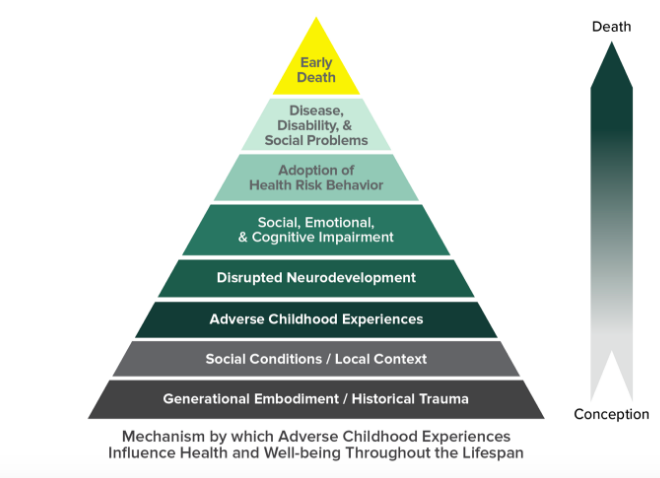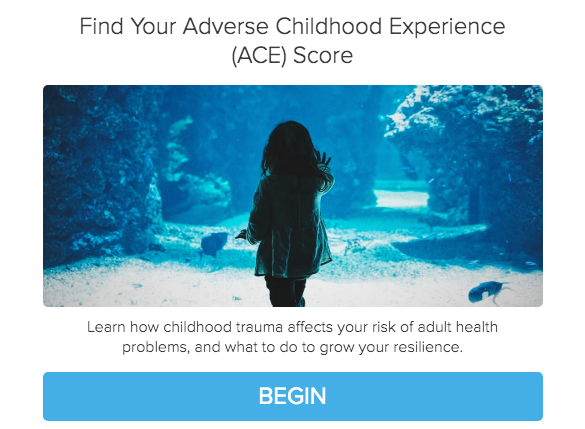The Adverse Childhood Experience (ACE) score is a measure of the trauma you experienced in childhood, giving you an indication of the level of health risk you should be on the lookout for in adulthood.
It has long been understood that chronic stress leads to toxicity in the body, which in turn creates a physical environment that allows illness to linger and take hold.
We all experience drama and trauma, be this from single events or sustained issues over time. But had you ever drawn the dots yourself between the stress in your formative years and a condition you may struggle with now?
WHY WOULD A MEDICAL DOCTOR TALK TO YOU ABOUT CHILDHOOD TRAUMA?
I’m a medical doctor who treats trauma and helps heal wounds caused by these adverse childhood experiences. So I’m telling you about the ACE score not to cause more worry, but to educate and inform. I’d love for you to take this knowledge onboard and use it to guide your own healing.
When you can begin to look at those less well-understood conditions such as chronic fatigue and generalized inflammation as physical reactions to long-term stress, you can better understand the importance of a holistic approach to healing that includes meditation and self-care.
We need to stop looking at health through only the single lens of the Western medical model. Western medicine has it’s place – but when we overlook complimentary therapies we miss so much opportunity for health and happiness. It is typical for us to be prescribed anti-depressants, but less common for us to be taught meditation or encouraged to walk in nature.
HOW DO WE KNOW ABOUT THIS?
When I was in medical school back In 1995, two physicians, Vincent Felitti and Robert Anda launched a large-scale epidemiological study that probed the child and adolescent histories of 17,000 people, comparing their childhood experiences to their later adult health records.
The results, published in 1998 were shocking: Nearly two-thirds of individuals had encountered one or more adverse childhood experiences (ACEs)—a term Felitti and Anda coined to encompass the chronic, unpredictable, and stress-inducing events that many children face.
EXAMPLES OF ADVERSE CHILDHOOD EXPERIENCES
If I had a dollar for every patient who told me that they’re own childhood “wasn’t all that bad”… when really they had a high ACE – you’d be amazed how often we minimize our own trauma.
We tell ourselves that the divorce of our parents wasn’t anything exceptional, as lots of people get divorced. Then we confuse this denial of our pain and suffering with resilience.
Our society teaches us to keep it together and carry on, smiling through our tears all the way. Then we wonder why we have such a healthcare crisis. I’m sorry to say this, but society got it wrong. We all deserved the time to process our trauma, and to have our pain seen and acknowledged.
Parental separation is an important question on the ACE quiz. It doesn’t matter that divorce is common – ACE trauma is common too!
As well as the divorce or separation of our parents, other adverse childhood experiences include:
- Being humiliated or verbally abused by your parents
- Being physically hurt or pushed around
- Sexual abuse
- Feeling unloved or unwanted
- Witnessing abuse of a parent
There are more, but this gives you the general idea. When we experience something traumatic at any age, we have both a physical and mental reaction to it. But when we experience trauma in our formative years, there is a deeper effect on the brain that carries on affecting us throughout life.
THE NEUROSCIENCE OF CHILDHOOD TRAUMA
When we experience something traumatic, it puts us in a state or ‘hyperarousal’, meaning that we are alert and ready to run or defend ourselves. Think ‘fight or flight’, and think about that excess adrenaline and cortisol flooding your body.
Now think back to childhood and consider your developing brain being repeatedly thrust into a state of hyperarousal whenever you were worried. Over time, that was a lot of extra hits of those stress chemicals, and this played a part in shaping your development.
We know that repetition is the basis of learning. So along with everything else you learned as a child; math, languages, art etc… you also learned to go into flight or fight mode whenever you were worried. This is why stress feels familiar in adulthood; so familiar in fact that you may even tolerate more than you should before you make a change in your life.
Let me say this clearly – please do not confuse tolerance of stress for resilience. They are very different things.
The trouble with having a high tolerance for stress is that in allowing stress to carry on it can become chronic and do more damage to our health than we are realizing, until we become really very sick indeed.
There is even an epigenetic level to this too. Small chemical markers adhere to genes that oversee the proper production of stress hormone receptors in the brain, tipping it into a state of constant hyperarousal. Stuck on autopilot, inflammatory chemicals keep coursing through the body, like a leaky faucet, building up corrosive effects that, as the years go by, have lifelong consequences for our health.
WHAT ARE THOSE HEALTH CONSEQUENCES?

The following are all seen in people who have high ACE scores:
- Alcoholism and substance abuse
- Allergies
- Anxiety
- Arthritis
- Asthma
- Autoimmune disease
- Behavioral challenges
- Cancer
- chronic fatigue syndrome
- depression
- diabetes
- fibromyalgia
- heart disease & high blood pressure
- poor immune system
- lung disease
- liver disease
- osteoporosis
- relationship difficulty
- suicide
LET’S STICK TOGETHER ON THIS
As I said before, ACEs are common. There are a lot of us in this boat, and we should stick together – there is true resilience in owning your ACE status and seeking out a supportive community. (Take a look at my Real Self Love community here.)
More than 60% of Americans and 50% of English people have experienced something in childhood that puts them at an increased risk of physical and mental health outcomes. ACEs have a clear correlation with mental health outcomes across the life course. The World Health Organisation (WHO) estimates that 30% of adult mental illness in 21 countries could be attributed to ACEs.
I was shocked to see that I have an ACE score of 4! We either can relate ourselves, or we know somebody who can.
START BY EDUCATING YOURSELF
If you identify with this, then great, this is the first step to truly recovering and growing your resilience (not your tolerance)! Take our In8Vitality ACE quiz to assess your own score.
Please don’t be shocked or worried if your score is high – this just means you now know what you’re working with. At the end of the quiz you will receive my recommendations for you, based on your score, to start rebuilding your health in a holistic way.



